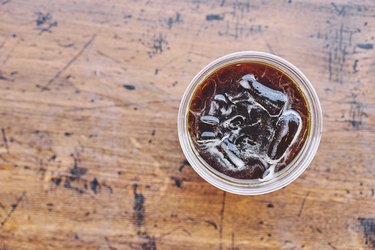
If you regularly exceed the recommended amount of sugar each day, you might be wondering if the soft drink sugar amount of your favorite beverage is to blame. While the amount of sugar varies, some of the more popular beverages contain more than 40 grams of sugar in a single 12-ounce serving.
Soft Drink Sugar Amount
Video of the Day
Depending on how often you consume sugar-sweetened beverages, you may not be aware of the soft drink sugar amount in some of the top drinks. In general, soft drinks contain sugar or artificial sweetener, carbonation, and natural or artificial flavoring. Some of the more common soft drinks include soda, sports drinks, energy drinks, sweetened teas, fruit punch and lemonade.
Video of the Day
The concern over soda sugar content relates directly to the number of beverages people drink each day. For example, the Centers for Disease Control and Prevention (CDC) reports that from 2011-2014, almost two-thirds or 62.9 percent of youth consumed at least one sugar-sweetened beverage on any given day.
To understand the amount of sugar that represents, it's important to know some of the more common soda sugar content. According to the USDA, a 12-ounce cola soft drink has 156 calories and 37 grams of sugar.
If that seems high, then the Mountain Dew sugar content is really going to shock you. Pepsico, which makes Mountain Dew, reports that a 12-ounce can has 170 calories and 46 grams of sugar.
A 12-ounce can of root beer will net you approximately 152 calories and 39 grams of sugar, while a 12-ounce fruit drink will add 112 calories and 21.9 grams of sugar. And some energy drinks that are labeled as soft drinks can have as much as 38 grams of sugar, according to the USDA.
Read more: The Top 10 Worst Soft Drinks For Your Health
Recommended Amount of Sugar
There is no recommended daily allowance for sugar, which leaves consumers asking, "how much is too much?" That said, many health authorities have set upper limits or recommended daily amounts, including the American Heart Association (AHA).
For optimal health, the AHA recommends a maximum of 100 calories or 6 teaspoons of sugar per day for adult women. And men, because they are generally taller and weigh more, should not exceed 150 calories or 9 teaspoons per day.
Until recently, product nutrition labels did not have to show the percentage of calories from added sugars, according to the CDC. This left consumers guessing as to the actual percentage of calories from sugar in that particular product.
However, the U.S. Food and Drug Administration issued new regulations requiring all packaged food and beverage containers produced by manufacturers to carry the new label, which shows the percentage from added sugars. The CDC points out that less than 10 percent of your daily calories should be from added sugars.
To give you a better idea of the added sugars you will find in soft drinks, check out this list from the CDC:
- High-fructose corn syrup
- Fructose
- Fruit juice concentrates
- Honey
- Sugar
- Syrup
- Corn syrup
- Sucrose
- Dextrose
Read more: The Effect of Refined Sugar on the Body
Ways to Limit Sugar
Making healthy beverage choices is a goal for many people who regularly consume soft drinks, especially those loaded with sugar. Unfortunately, grabbing a can of Coke or guzzling your favorite sweet tea can become a habit and one that is difficult to break. The good news? There are several ways you can cut back or even eliminate the soda sugar content in your diet.
- Swap out a can of soda for a fountain drink with tons of ice and half the soda
- Buy the mini cans of soda or other beverages
- Drink sparkling water with a lemon or lime added
- Add strawberries, lemons, kiwi, grapefruit, cucumber, watermelon or limes to your water for a fruit-infused beverage
- Add 1-2 tablespoons of 100 percent fruit juice to plain sparkling water
Drinking diet beverages is another way people reduce the amount of sugar in their day. Despite the appeal of no sugar and zero calories, several experts and researchers have raised questions about the effectiveness of replacing sugary sodas with diet soft drinks. The Mayo Clinic points out that while making the change will help you save calories, it's not clear if it can prevent obesity and other health-related problems.
- The American Heart Association: "Sugar 101"
- The Centers for Disease Control and Prevention: "Rethink Your Drink"
- The Mayo Clinic: "Diet Soda: How Much is Too Much?"
- U.S. Department of Agriculture, FoodData Central: "Soft Drink, Cola, Fruit or Vanilla flavored"
- Pepsico: "Mountain Dew"
- U.S. Department of Agriculture, FoodData Central: "Energy Drinks"
- U.S. Department of Agriculture, FoodData Central: "Root Beer"
- U.S. Department of Agriculture, FoodData Central: "Fruit Juice Drink, Citrus, Carbonated"
- The Centers for Disease Control and Prevention: "Sugar-sweetened Beverage Consumption Among U.S. Youth, 2011–2014"
- The Centers for Disease Control and Prevention: "Learn How the NEW Nutrition Facts Label Can Help You Improve Your Health"
- U.S. Food and Drug Administration: "Changes to the Nutrition Facts Label"